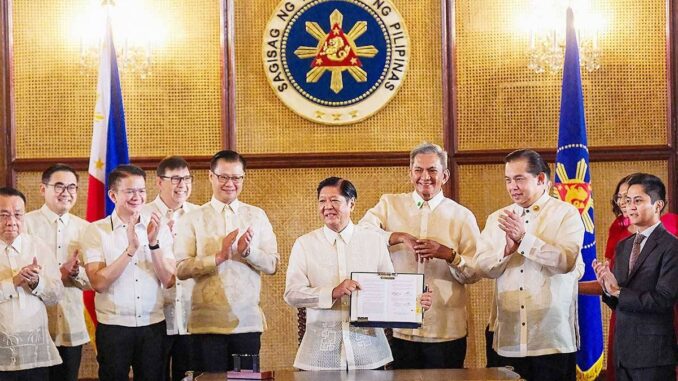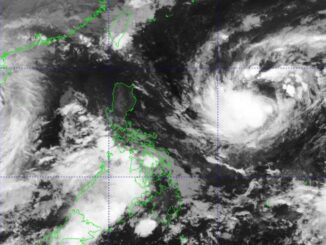
(UPDATE) PRESIDENT Ferdinand Marcos Jr. on Monday signed into law Republic Act 12066, also known as Corporate Recovery and Tax Incentives for Enterprises to Maximize Opportunities for Reinvigorating the Economy (Create More) Law.
The law amends RA 11534, or the original Create Act, which was crafted to help enterprises recover from the impact of the pandemic by lowering corporate income tax rates and making the country more appealing to businesses by rationalizing fiscal incentives.
“The reforms we have instituted in Create More are a testament to our firm resolve to roll out the red carpet for investors, usher in critical investments, and foster a conducive and robust environment for businesses to thrive,” Marcos said during the ceremonial signing held in Malacañang.
“The Philippines is open for business, and the Filipino people mean business,” he added.
The law further streamlined the value-added tax (VAT) refund process by limiting the documentary requirements and addressing the VAT concerns raised by export-oriented enterprises.
To address investors’ pain points and cultivate an investment-friendly climate, RA 12066 also introduced various reforms, such as the rationalization and streamlining of incentives-related processes.
It also simplifies taxation by imposing a local tax on registered business enterprises (RBEs) in lieu of all other local taxes, fees, and charges.
The law is guided by five overarching objectives: improving ease of doing business, increasing the competitiveness of tax incentives, strengthening governance and accountability, and clarifying value-added tax rules and transitory provisions for pre-Create RBEs.
It also addresses local taxation during the income tax holiday and enhanced deductions regime, clarifying areas previously unaddressed by the Create Act. This aims to create a fair and balanced local tax system, giving businesses “greater certainty” while ensuring local communities benefit from their presence.
The legislation establishes a more efficient approval process by raising the investment capital threshold for Investment Promotion Agencies from P1 billion to P15 billion, allowing only projects exceeding this amount to be reviewed by the Fiscal Incentives Review Board, he said.
Further, it seeks to attract both domestic and global investments, particularly in strategic industries that will shape the country’s future, Marcos stated.
“Create More sets the stage for a business landscape that empowers our enterprises and enhances their growth prospects. By building on the reforms initiated through the Create Act, we have enhanced our tax regime [and] incentive framework, and making it more inviting for investment — while remaining steadfast in the principles of fiscal prudence and stability,” the President said.
“Create More is a tangible proof that we hear and respond to the voices of the business community. This reaffirms our commitment to work hand-in-hand with enterprise, continually seeking avenues to make your investments grow and prosper,” he added.
Sen. Juan Miguel Zubiri, author and co-sponsor of the law, said it would cut the bureaucratic red tape that has hampered the business sector’s growth and address problems of longtime investors in the country, including the protracted process of claiming VAT refunds.
“We wanted to straighten out and simplify the process of VAT refunds because this has been an issue for many major locators in the country,” Zubiri said on Monday.
“They go years and years without seeing the refunds that they are entitled to, and they lose billions in the process,” he said in a statement.
Zubiri said he pushed for the passage of the law after looking into the VAT refund complaints of existing investors in the Philippines, particularly Japanese investors such as Itochu Corp., the parent company of Dole Philippines.
“Former Japanese Prime Minister Fumio Kishida himself brought these concerns up with us when we went on a parliamentary visit to Japan in 2023. That meeting was crucial in my push for the measure,” Zubiri said.
“If existing investors are losing billions here, naturally, they would want to leave, and there are many investment options available to them now, especially among our Southeast Asian neighbors,” he said.
Zubiri added, “If they leave, that’s thousands of jobs gone, and we become a no-go for other potential investors.”
“The key to boosting our economy and creating more jobs is inviting more investors in. And the key to inviting more investors in? Taking care of the ones who are already here,” Zubiri said.
Speaker Martin Romualdez, a principal author of the new law, said the amendments made to the Create Act were aimed at attracting more foreign investors.
“We acted fast to make adjustments in the law to preserve existing investments and to attract additional capital,” Romualdez said.
He pointed out that the new law incorporated inputs gathered from the President’s recent investment missions abroad “by adding tax income deductions and streamlining VAT-related procedures.”
“We hope the changes will satisfy our existing investors and entice more foreign capitalists to invest in the country,” he said.
Albay 2nd District Rep. Joey Salceda, chairman of the House Committee on Ways and Means, which is the House’s tax panel, thanked the President for signing the Create More measure into law.
“If you think deeply about it, Create More is the largest pro-labor legislation in recent memory,” Salceda said.
“It increases the demand for labor by encouraging more investments. This is the only way to truly sustain higher wages,” he said.
“This measure will directly create at least 142,000 high-quality jobs in the first three years and indirectly induce the creation of some 860,000 indirect jobs,” Salceda said.
Meanwhile, the Department of Labor and Employment expressed its full support to the enactment of RA 12063, institutionalizing enterprise-based education and training to address skills mismatch and ensure the competitiveness of the Filipino workforce.
Labor Secretary Bienvenido Laguesma on Monday said the Labor Department is committed to helping achieve the administration’s target through active collaboration with the private sector to generate productive, remunerative, and sustainable job opportunities while working on the longstanding problem of job-skills mismatch.
Laguesma stressed the need to upskill and reskill workers, especially new entrants to the labor force, to increase their competitiveness and employability locally and globally as economies around the world continue to recover from the impact of the health crisis.





Be the first to comment